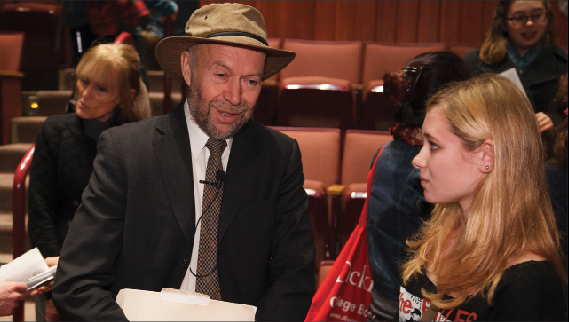James Hansen Speaks as Priestley Winner

James Hansen, winner of the Joseph Priestly Award, presented a lecture.
Climate scientist and former director of the NASA Space Studies Institute James Hansen joined the ranks of 16 Nobel Laureates when he was presented with the Joseph Priestley Award on Nov. 7, 2013 in Anita Tuvin Schlecter Auditorium.
Hansen, who currently serves as an adjunct professor at Columbia University’s Earth Institute, was trained in physics and astronomy at the University of Iowa before joining the Goddard Institute for space Studies at NASA. Hansen was one of the first scientists to use global climate models to track and project the influence of human activity on the earth’s changing climate. He testified before congressional committees multiple times in the 1980’s about the affects of climate change, thus raising a broader awareness of its causes and potential dangers. Hansen is widely considered one of the world’s preeminent voices on climate change and environmental issues.
The Priestley award is presented annually to a scientist whose work has benefitted the welfare of humanity. The award is given in honor of Joseph Priestley, a friend of Dickinson founder Benjamin Rush and the discoverer of oxygen.
“It is appropriate that we honor Dr. Hansen’s work with the Priestley Award. Priestley is noted as the discoverer of oxygen and did pioneering work on what he called ‘different kinds of air,’” said Greg Howard, assistant professor of Environmental Science, in his introduction of Hansen’s lecture. “Dr. Hansen’s work, starting with ‘different kinds of air’ and encompassing almost all aspects of modern climate science, has been extremely influential. It is a measure of his success that when we hear the word ‘sustainability’ or even ‘environment’ today our first though it often of carbon and of climate.
As the Priestley Award winner, Hansen delivered a lecture titled “White House Arrest and the Climate Crisis,” in which he spoke of his experience with climate change research and, later, his role as an advocate and public figure. The title of his lecture referenced his recent political activity, which has resulted in multiple arrests due to his participation in climate change protests that called for President Obama to reject the Keystone Pipeline extension. During his presentation, Hansen also featured highlights from his past research on global climate models and climate change, and examined ways to discourage fossil fuel use and incentivize sustainable alternative energy sources.
“Our parents didn’t know that by burning fossil fuels they would create a problem for future generations, but now we can only pretend that we don’t know… the basic problem is that fossil fuels seem to be the cheapest energy, but [in reality] they’re partially subsidized and they don’t have to pay their cost to society.”
Hansen advocated for carbon fee and dividend legislation that would impose a fee on fossil fuel use and incentivize reducing an individual’s or a business’ carbon footprint.
“What we need to do is collect a fee from fossil fuel companies and distribute the money to the public so that the person who does better than average limiting his fossil fuel use will make money,” said Hansen. “As the fee rises over time we can gradually phase out fossil fuel use.”
After the conclusion of his lecture, Hansen answered questions from the audience before being presented by president Nancy Roseman with the Priestley medallion.
Though none would refute his contributions to the field of climate science, some students critiqued the content and delivery of his presentation.
“I respect all of his research but I don’t think his presentation was effective because he didn’t add anything to the conversation,” said Jenny Morris ’17. “The two main points I took away were that global warming exists and our generation needs to solve it, but I already knew that.”
“James Hansen is an inspiration for people interested in globalization and sustainability, and he also had a big influence on other [advocates such as] Bill McKibben,” said Hannah Storey ’16, referencing Bill McKibben, an environmental journalist and activist who visited campus this past spring. “Anyone involved in the climate change world knows and admires him. His presentation was good, but he’s a scientist, not a public speaker.”
In addition to the Thursday night programming, Hansen also visited the college farm and spoke to students in Environmental Policy, Global Environmental Politics, and Aquatics Management classes. The Center for Sustainability Education also hosted a breakfast question and answer session with Hansen on Friday, Nov. 8 that was well attended by student representatives from organizations on campus. Howard felt that his visit had a positive effect on the campus community.
“It was great for all of us to have the opportunity to connect with such an eminent scientist, and one whose work has been so influential,” said Howard. “It was great for our students to get to talk to him about his work and to how a scientist can be so motivated by a problem that he is ready to talk about political and economic solutions, like his carbon fee-and-dividend proposal. His work is a great example of the importance of scientific research and of the importance of seeing the connections with policy issue. It was inspiring to all of us to have him here.”





